In the era of big data and the rapid development of artificial intelligence, the profound impact of algorithms on society has become increasingly evident. Algorithms have emerged as the heart of machine intelligence in the digital age. Accurately understanding the role of algorithms in the process of social development, as well as promoting their effective service to humanity and fostering equitable development, are pressing issues that require in-depth discussion among all stakeholders, including government, businesses, academia, and society.
On the morning of November 23, 2024, the "Algorithms for Humanity" seminar took place at the Science Lecture Hall of the Zhongguan Xinyuan Campus at Peking University. The event was jointly hosted by the China Social and Development Research Center, the Department of Sociology, the Digital Governance Research Center, and the National Engineering Laboratory for Big Data Analysis and Application Technology at Peking University. Over 100 participants from government agencies, universities, research institutions, and industry attended the seminar. The agenda included keynote presentations and an academic forum, focusing on the impact of algorithm applications on human social life and the governance of algorithms, facilitating discussions and exchanges on these topics.
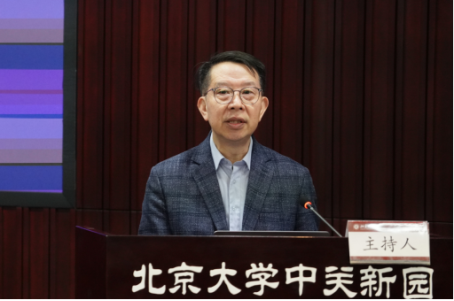
Prof. Qiu Zeqi Delivering Speech
Keynote Presentations
Professor Chu Xiaobo, Dean of the School of Social Sciences and a faculty member at the School of International Relations at Peking University, reflected in his opening remarks on the diverse initiatives and numerous achievements of the university's social science disciplines in leveraging digital technologies to advance academic development amidst the digital wave. In discussing the relationship between algorithms and human social development, he proposed that "Algorithms for Humanity" can be interpreted from two perspectives: "laws derived from human calculations" and "human calculations of laws." The former emphasizes that algorithms can characterize all aspects of the physical world and human society, while the latter indicates that everything in today's world is undergoing processes of structuring, standardization, datafication, and algorithmization.
The close connection between algorithms and human society suggests that we cannot abandon algorithms due to their potential to alienate individuals, nor can we allow their widespread presence to lead to self-deterioration. As algorithms empower and promote inclusive societies, understanding the responsibilities associated with algorithms and the governance of algorithms becomes critically important. Peking University has been actively supporting digital humanities projects, establishing a digital platform for the humanities and initiating the formation of a national alliance of experimental laboratories for philosophy and social sciences in higher education institutions.
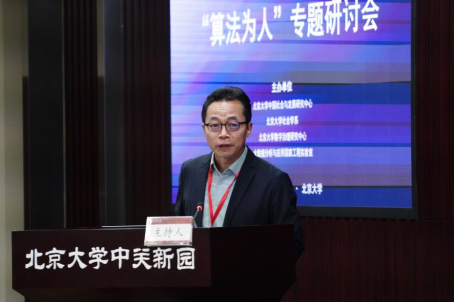
Prof. Chu Xiaobo Delivering Speech
The conference also invited experts from relevant government departments to participate in the discussions. They emphasized the importance and urgency of comprehensive algorithm governance in the current era. With the rapid popularization of the internet, algorithms have penetrated all aspects of social life and played a crucial role in China's progression from a major cyber country to a cyber power. Meanwhile, the risks and problems brought by algorithmic development require strengthened comprehensive governance to ensure healthy and orderly algorithmic development. Algorithm governance is a systematic project that requires Party leadership and multi-stakeholder efforts to enhance security awareness, strengthen regulatory management, and promote comprehensive algorithmic empowerment to achieve the goal of making algorithmic technology serve the people.
In his keynote speech on "Operations Research Optimization Algorithms and Digital Intelligence," Professor Wen Zaiwen from the Beijing International Center for Mathematical Research traced the historical origins of operations research to its applications in the digital age, deeply exploring the critical role of operations optimization in modern society. Operations optimization involves not only the establishment of mathematical models and algorithm design but also the refinement of requirements, algorithm design, and decision-making in practical problems. With the development of big data and artificial intelligence, operations optimization faces new challenges and opportunities in handling large-scale data and complex constraints. Through specific cases such as factory production scheduling and municipal resource allocation, Professor Wen demonstrated the importance of operations optimization in decision-making in major areas of national economy and people's livelihood. He also mentioned the National Engineering Laboratory for Big Data Analysis and Applications' practices in combining optimization algorithms with big data models, illustrating how operations optimization promotes efficiency improvements across multiple industries.
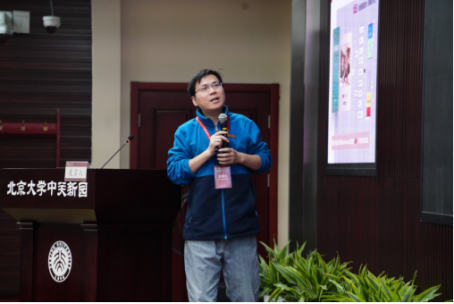
Prof. Wen Zaiwen Presenting
Li Jiwei, Executive Dean of Meituan Research Institute, addressed the topic "Walking with Digital Technology: Interaction Practices and Reflections on Algorithms and Humans," discussing Meituan's efforts to promote algorithm transparency, listen to riders' feedback, and drive balanced algorithm practices. Li Jiwei proposed that algorithms are not merely technical issues but also involve social ethics and interpersonal relationships. The delivery algorithm must consider the relationship between the platform and the riders, as well as the complex balance involving merchants, consumers, and other stakeholders. The relationship between algorithms and humans is not a one-dimensional control but a symbiotic relationship that promotes mutual growth. Algorithms need to be continuously improved in practice to better serve humans and achieve higher social value.
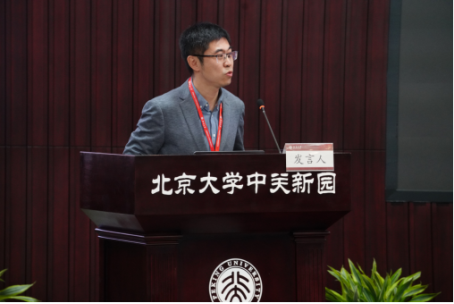
Prof. Li Jiwei Presenting
Wang Peng, a senior expert at Tencent Research Institute, summarized the institute's thoughts on algorithm governance in his speech "Reflections on Algorithm Governance" by focusing on three key concepts: "trustworthiness", "benevolence", and "creativity”. He proposed a holistic framework for understanding algorithm governance through legal, ethical, technological governance, and resource-driven approaches. In terms of "trustworthiness," algorithm governance should emphasize the logical rigor and accuracy of algorithmic recommendations, ensuring that the content output by large models stems from credible, knowledge-based sources. Regarding "benevolence," algorithm governance should focus on the humanitarian care of large models towards societal groups, especially vulnerable populations, by collaborating with social welfare organizations and academic groups to establish benevolent corpora. In the aspect of "creativity," algorithm governance highlights the creative power of large models, promoting innovation in fields such as artistic creation and urban planning through the open-sourcing of text-to-image large models and co-creation with communities.
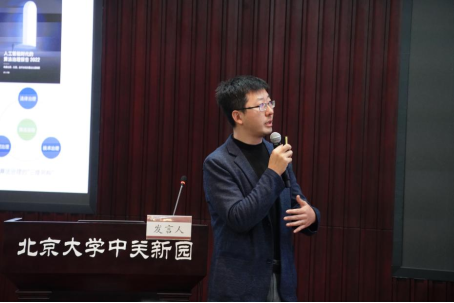
Wang Peng Presenting
Professor Zhang Linghan from the Institute of Data Rule of Law at China University of Political Science and Law, and an expert at the United Nations High-Level Advisory Group on Artificial Intelligence, spoke on the topic of "International Experience of 'Human-Centric Artificial Intelligence'". He posited "human-centric" as the core principle of AI governance, warning of the catastrophic consequences of neglecting human-centric principles, and emphasized the importance of maintaining human agency in the field of artificial intelligence. He also proposed functions that global AI governance should possess, including scientific consensus, rule coordination, global monitoring, and mechanisms for reporting AI safety incidents. Professor Zhang noted that although the international community widely agrees on the governance concept of "human-centric" principles, there are significant differences in the implementation methods and priorities among countries. Therefore, there is a need to establish an inclusive global AI governance mechanism. As a responsible power, China has transitioned from being a "follower" and "compeer" to a "leader" in AI regulation, with notable legislative progress and effectiveness in the protection of personal information and the application of AI in the judicial field.
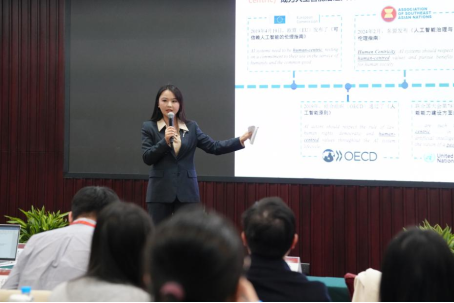
Prof. Zhang Linghan Presenting
Associate Professor Chen Long, Director of the Social Policy and Development Research Department at the College of Humanities and Development Studies, China Agricultural University, delivered a report titled "Tacit Knowledge, Craftsmanship, and the Limits of De-skilling," drawing on his field research. He argued that the work of food delivery riders is not low-skilled labor as traditionally perceived. Even in seemingly low-skilled industries, there are high-skilled workers, and food delivery riders still have a dominant ability in their work. By comparing the work efficiency and income differences between new and experienced riders, he found that the labor of food delivery riders is not entirely dependent on algorithms. The labor process of food delivery riders often involves the workers' intuitive judgment and spirit of work, which includes tacit knowledge and craftsmanship—qualities that machines find hard to replace. Professor Chen emphasized that these skills require time to develop, but high turnover rates mean many riders leave the industry before their skills mature. He called for society to re-evaluate and respect the work of delivery riders, to affirm and respect the labor skills of workers, and to help more workers develop their labor skills.

Prof. Chen Long Presenting
Peking University's Distinguished Boya Professor He Yanling, in her address "Technology for People, Governance for Good," emphasized the importance and urgency of technology governance in modern China. She argued that China's domestic governance depth determines global governance heights, with technology offering new governance pathways. Technology can reshape governance, addressing social stratification, wealth distribution, and risk management through precise needs responses, efficient fiscal spending, refined policy tools, scientific routine governance, and systematic organizational reform. Professor He highlighted "technology for good" as key to governance transformation, enabling agile and precise change. Technology identifies societal needs, overcomes resource constraints, provides personalized services, bridges institutional gaps, and achieves "algorithms for the people."

Prof. He Yanling Presenting
Academic Forum
The academic forum of the "Algorithms for Humanity" symposium was held on the afternoon of the 23rd in the Starlight Hall of the Yingjie Exchange Center at Peking University. The forum was divided into four thematic sessions: "Algorithmic Empowerment and Social Development," "Generative AI Empowerment and Applications," "Algorithmic Neutrality and Media Communication," and "Artificial Intelligence and Human Autonomy."
The "Algorithmic Empowerment and Social Development" session was chaired by Zhao Lei, a researcher from the Institute of Labor Relations at Renmin University of China. Ma Dongling from Peking University's School of Education shared her research on "The Light and Shadow of Algorithms: Potential and Challenges in Promoting Digital Equality," discussing the potential and challenges of algorithms in promoting digital equality and social justice, particularly their dual role in education and market resource allocation. Professor Bi Wenfen from the School of National Governance at Southwest University presented her research titled "Research on the Predicament of Rural Women's Livestream E-commerce in Southwest Ethnic Regions Under Platform Algorithmic Logic - Taking Douyin as an Example," analyzing how Douyin's algorithmic logic affects rural women's livestream e-commerce activities in southwestern ethnic regions, revealing their disadvantaged position relative to MCN institutions in livestream sales. Professor Ji Guangxu from the School of Journalism and Communication at Guangdong University of Foreign Studies, in his research "Algorithmic Culture - A New Anthropological Attempt in the Age of Ubiquitous Intelligence," approached algorithms from an anthropological perspective, arguing that algorithms are not just technological objects but also part of cultural practices, emphasizing the importance of understanding algorithmic culture through anthropological methods.
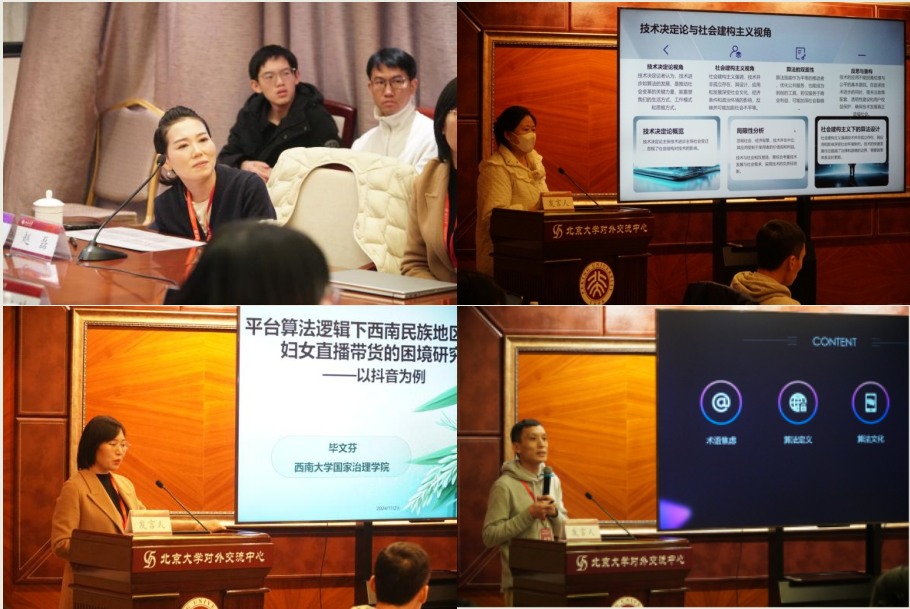
The "Generative AI Empowerment and Applications" session was chaired by Associate Professor Zhao Yizhang from Tsinghua University's School of Social Sciences. Professor Gong Weigang from Wuhan University's School of Sociology presented on "Large Language Models Empowering Humanities and Social Science Research," using text mining of legal case decisions as an example to discuss practical approaches for humanities and social science scholars to conduct research using large language models. Professor Chen Xi from Yunnan University's Department of Management Science presented research titled "Focusing on Benefits While Overlooking Drawbacks: Individual Privacy Trade-offs in Increasing Returns Interactions with Large Language Models," attempting to define personal privacy information involved in human interactions with large language models and discussing associated risks and benefits. Professor Chang Yuanqing from Peking University's Department of Sociology presented research on "Real or Fake: Human-like Characteristics and Ethical Challenges of Generative AI-powered Social Bots in Social Interactions," introducing the "human-like" characteristics displayed by social bots on social platforms and discussing the ethical and moral risks inherent in the application of social bots.
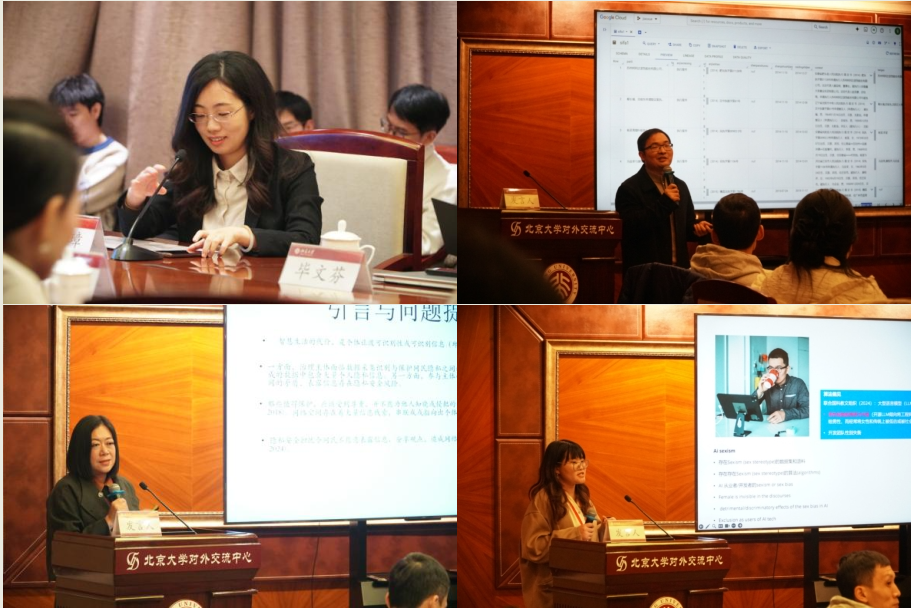
The session "Algorithmic Neutrality and Media Communication" was chaired by Xiang Jinglin, an associate researcher at the Institute of Sociology, Chinese Academy of Social Sciences. Chen Qiuxin, a faculty member at the School of Media and Communication at Soochow University, presented research titled "The Marginalization of Humans in Technological Systems and Its Implications: An Examination Based on the Evolution of Social Technological Imaginaries of Human Flesh Search," analyzing the changes in power dynamics among different social actors during the evolution of technology, thereby deepening the discussion on the ontological debate between humans and machines in the context of widespread algorithmic application. Zhao Longxuan, a faculty member at the College of Arts and Media at Tongji University, spoke on "Friends and Foes in the Same Body: The Digital Existence of Marginalized Groups under Algorithmic Mediation—With Queer Men as an Example," focusing on the cognitive level and attitudes of marginalized social groups towards algorithms and interpreting their behavioral patterns under algorithmic influence. Zhou Lujun, a faculty member in the Department of Sociology at China Women's University, shared research titled "How to Do Good? An Empirical Survey Based on the Technological Gender Values of Artificial Intelligence Practitioners," discussing the challenges faced by technology practitioners in achieving the goal of "technology for good" in the field of gender equality through a comparative analysis of the technological gender perspectives of different practitioners.
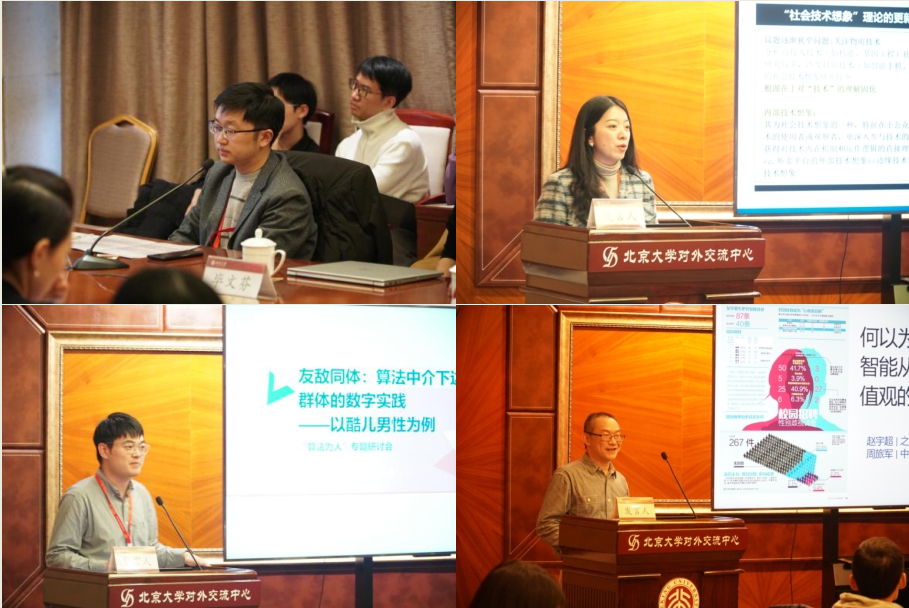
The session "Artificial Intelligence and Human Autonomy" was chaired by Liu Xiangying from the Chinese Social Science Magazine. Wu Yufei from the Department of Sociology at Peking University, in her presentation titled "The Love and Fear of Engineers: A Preliminary Discussion on Effective Accelerationism," explained how technology engineers, under the influence of effective accelerationism, are gradually becoming emerging governance actors leading the global order in the intelligent era. He Rong, a faculty member at the Institute of Sociology, Chinese Academy of Social Sciences, in her research "The Morphology and Impact of Faith-based Lifestyles in the Age of Algorithms," depicted the characteristics of online religious communities formed in the algorithmic age and the interactions among their members, comparing them with traditional religious communities. Xiang Ning, a faculty member at the Institute of World Religions, Chinese Academy of Social Sciences, in his presentation titled "Reflections on the Explanability of Large-Scale 'Guessing Machine' Algorithms and Human Autonomy from the Perspective of Digital Humanities," explored solutions for the explainability of large-scale 'guessing machine' algorithms and human autonomy by analyzing three empirical studies within the framework of digital humanities.
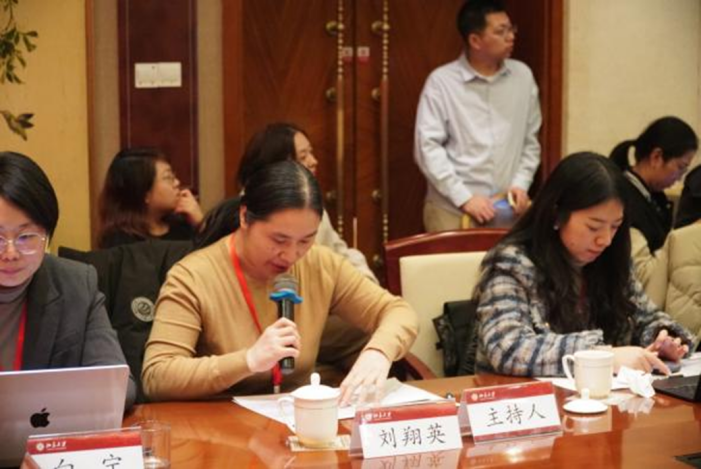
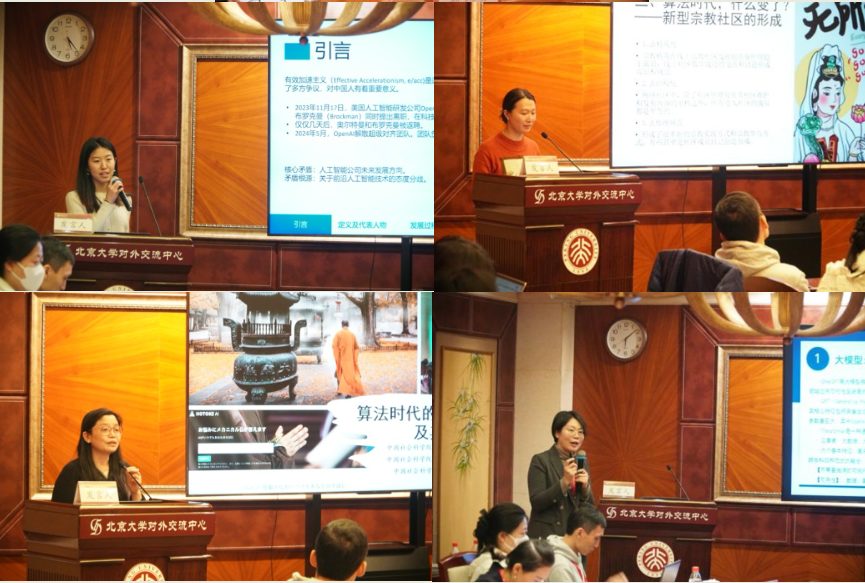
Professor Qiu Zeqi, Director of the Center for Digital Governance at Peking University, summarized the conference, emphasizing the crucial role of algorithm governance in promoting social development and ensuring a clear cyberspace. He called for joint efforts from all sectors to advance the realization of algorithms serving humanity.